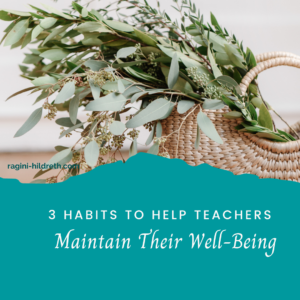
Starting the new academic year is an exciting time full of possibility.
Many teachers love the feeling that there is a clean slate and that they have the opportunity to set the tone for the year, establish boundaries and launch their plans.
On the flip side, others are apprehensive, and as the momentum of school life starts to increase, they are wondering if they will be able to manage the pressures that will come.
Past experience has led them to fear that they might run out of energy and enthusiasm halfway through the year.
In effect, they have lost confidence and hope that they will not feel overwhelmed by July.
A powerful way teachers can sustain their energy and enthusiasm is to develop 3 habits that support their well-being.
These are:
- The habit of making well-being a goal
- The habit of forward planning
- The habit of nurturing relationships.
The Habit of Making Your Well-being a Goal
As a teacher, it is essential to maintain your well-being. One way to do this is to set well-being goals for yourself.
Take some time to define your goal to finish the year well.
Is your aim to reduce pressure points around meeting deadlines? Is it important that you leave space for home life? Are you focused on reducing emotional peaks and troughs?
It is vital to have a clear understanding of your goal to help you stay focused.
Over commitment can easily become a habit, so avoid distractions because striving to accomplish too many things only leads to overwhelm.
Getting into the habit of setting personalised goals for yourself will help you stay on track and maintain your well-being.
The Habit of Forward Planning
The habit of forward planning is a useful strategy to help teachers maintain their well-being.
By looking at the entire academic year and planning ahead, you can make sure that you have time for the things that are important to you and your well-being.
With an overview of the year, you can assess what is needed and develop habits to anticipate and prepare for pressure points
For example, writing end of year reports involves investing many hours to complete them.
Assessment data, personal and social information, friendships and attitudes are some of the information that is needed.
Having a system to collect and organize data early in the Autumn term will help to reduce workload later on.
In my experience, habitually collecting and recording information on each child, significantly reduces pressure when reports were due.
You can read more about the benefits of long-term planning in this blog on Time Tips for Teachers.
The Habit of Nurturing Relationships
It is essential to develop the habit of assigning time to nurture relationships in school as being an effective teacher or school leader can only happen with positive relationships.
Think about how to set up a ‘getting to know you’ cycle with pupils, colleagues and families.
Genuinely showing an interest in their lives facilitates bonding with people that you will be interacting with for many days.
Give your class time to share
- their passions and interests
- how they feel about different subjects
- what they think their strengths are
- where they would like support.
Some of these conversations will be private, but they build positive relationships and create a foundation of trust and respect that can increase harmony in the classroom.
Additionally, asking the children for help and involving them in making decisions will allow them to feel that they are valued partners.
How about your peers.
Could you allocate regular times to connect with colleagues? Are you willing to offer support such as simply sharing good practice? How do you feel about asking for help?
Regularly spending time together will build relationships so that it becomes easier to ask for help if and when you need support.
Finally, developing new habits takes time, so begin where you are and take small steps.
With consistency, small incremental changes are much more likely to be successful over time than one massive leap!
Regularly review whether you are achieving your goal and make any adjustments that are needed.
Assess if you are regularly anticipating pressure points and actively nurturing relationships.
By aligning your habits with your goal of maintaining your well-being you will be sure to finish the year well.

Would you like more support? I love helping teachers who are feeling anxious about their well-being regain control of their lives. By integrating my 30 years experience of teaching, leadership and coaching, I have developed personalised coaching support to empower teachers to flourish.
To find out more simply click to book a 15 minute call and take a step towards improving your well-being.
COMMENTS